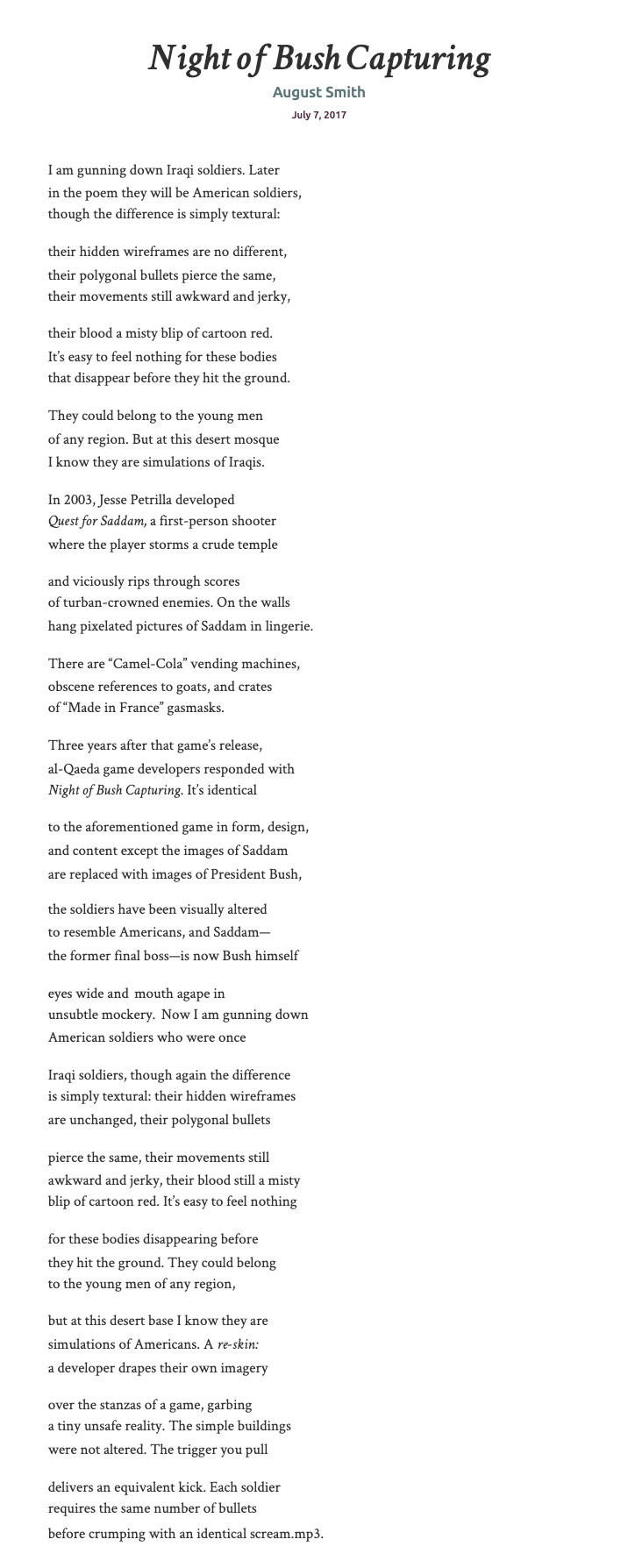An Overview of My Videogame Poems 2012-22
mario kart, simulations, process notes, poetry tips, scraps
From 2012 to 2022, I wrote and published 9 chapbooks as well as a handful of other pieces, roughly totalling 160 poems. I’d estimate that 20% of those poems were somehow related to videogames, ranging from poems about specific games, to poems with nondistinct videogame-like imagery, to poems that played with themes (agency, simulation) that are often expressed through videogame-related language. I’m not writing this because I feel like I’m “finished” writing about videogames. It’s actually the contrary: I want to write about games more, and more prosaically, so I want to catalogue what I’ve written up to this point.
The first time I heard a poem about a videogame was in 2011. As an undergraduate student, I joined an English “honor’s society” because it seemed like an easy way to access university money for travel. During one panel at a conference in Pittsburgh, a young poet from Las Vegas read a jokingly somber poem from the perspective of Super Mario. This is not a mindblowing concept in retrospect, at least not to me anymore, but at the time I had just started writing my own poems, and the Super Mario poem crossed some wires in my head. Eventually I grew to realize that into poetry’s maw I could feed any obsession, thought, idea, image, memory, or scrap of text, and something strange and funny would pop out.
What follows is a nonchronological catalog of the offspring of those recurrent realizations as they relate to videogames. I know I’m not the first, the last, or the best to do it; I hope this post doesn’t scan as hagiographical. All these poems and their chapbooks are available as PDFs on my website right under the Chapbooks dropdown menu.
The Mario Kart 64 Poems (2015)
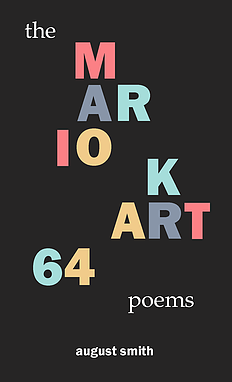
This chapbook was my fourth. I put it out through my own small press, Cool Skull Press, and sold a couple hundred copies over the years through mailings, readings, and a tour.
The book consists of 16 prose poems, one for each track in Mario Kart 64. At the time, I was interested in “project poems” or serial poems, which I suppose is a subset of conceptual poetry. I liked how some poem projects borrowed parameters and formal structures from other mediums, like Jack Spicer’s The Holy Grail, or Louise Gluck writing poems about the plants in her garden, or, way closer to the point, Brian Oliu’s Leave Luck to Heaven, a series of yearning prose poems about old NES games. The influence of that last one is apparent in the Kart chapbook, and Brian was gracious enough to blurb it.
This chap wasn’t purely nostalgia indulgence, though that was part of it. There’s something beautiful and wooly about all those early 3D games: their fogginess, invisible walls, and sharp edges, their jankiness, their endlessly blank and haunting horizons, as inscrutible as the faces of their characters. I think low resolution leaves more to the imagination. And videogames themselves are kind of like lower-resolution versions of reality; if you squint your eyes they seem passably real. I tried to fill in those resolution gaps by conjuring a bunch of weird voices to speak their colorful world into a place with gravity, and death. I was really into the idea of in-game beings becoming self-aware, a sort-of reverse The Matrix scenario, which I imagine gives the book the tinge of horror in poems like “Frappe Snowland.”
Overall, lots I’d do differently if I wrote it now, but some fun stuff. Good job August. Here’s the poem from the collection people seemed to like most, excerpted with an interview at cuttyspot:

“Luigi Raceway” and “Moo Moo Farm” also appeared in Queen Mob’s Teahouse.
Bonus Zones (2016)
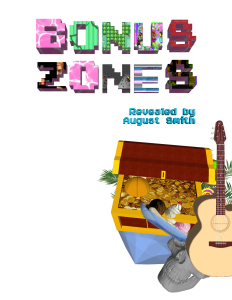
Bonus Zones was published as part of Ghost City Press’s Summer Microchapbook Series 2016. It consists of 8 long, skinny poems with justified margins. Embedded in the poems are references to RPG-style items, and each item is given a small haiku-like poem of its own.
This chapbook was riffing on three forms. First and foremost, it was inspired by videogame walkthroughs, an undevalued literary form. Walkthroughs are YouTube videos now, but when I was a kid, walkthroughs were usually huge, haphazardly organized pages of text with an ASCII-art banner. Sometimes they were helpful and clear, written in plain language as a straightforward set of instructions with just enough detail to orient your own playthrough. Othertimes they could be obtuse, voicey, and confusing, like a kid trying to describe the plot of their favorite movie. I tried to hit both of those nodes in this project.
The second form Bonus Zones was riffing on was the RPG convention of “item descriptions.” Game developers often use this little void of text for some lore/world-building or for a quick joke, It seemed like a natural challenge to try and bring that convention into the poems. Videogames are full of funny objects: swords, rings, keys, crystals, health packs. These things often have weird, incongruant relationships to each other, and to their world. It was fun to cram them into these poems, and their embedded mini-poems let me nest double-meanings and references and counter-tones into the main poem’s flow.
The third form that inspired these poems is that of the “playground videogame legend.” I have fond memories of these legends growing up: classmates telling you how they unlocked Mew by talking to Prof. Oak 555 times, or your cousin lying that Master Chief was in Super Smash Bros. Melee but you had to defeat the final boss with a banana to unlock him.
Bonus Zones was less about games themselves and more about the stories we tell around a game. The actual plots of games are so unreal, so secondary to me. They never describe the actions of the player who plays the game, a plot which usually unfolds in blocky, artless chunks (red key in red door, go up stairs, walk twenty paces and then push A, speak to Fernando). It’s fun to play with these conventions of storytelling and language, and to try and wring something beautiful and abstract out of them.
I remember these poems going over very well during readings, which you might not expect from looking at them.
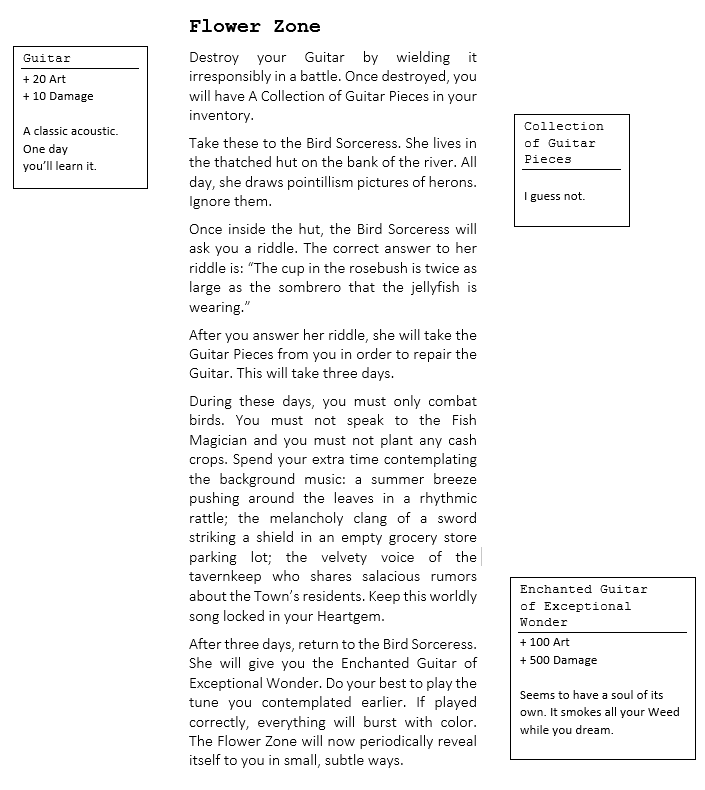
Bird Lizard Horse (2015)
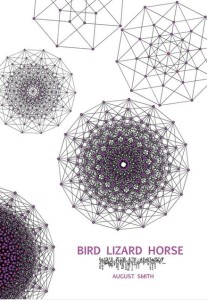
Bird Lizard Horse was a winner of Nostrovia! Poetry’s chapbook contest in 2015. The only videogame poem of note in this book is “Mario Parties,” a poem I dedicated to my friend John Carroll. I had found success in a certain formula by this point: slightly over-serious but darkly silly poems from the perspective of a fictional character or famous individual. I had written one about Obama that got turned into a short, and one about Waka Flocka Flame that had earned me a bunch of followers on tumblr. “Mario Parties” was like these.
"Mario Parties"
This one mostly operates on the juxtaposition of Mario sunshiny happy shit and real life shit. It sucks to be the villains in a place where everyone is happy. I don’t think there’s a lot of complexity to the poem beyond that, but I think there’s some emotional depth, and the sections work together well as a smooth story arc. I thought referencing a Nissan Stanza in a poem was funny. I still do!
Sectioning poems out as isolated but interrelated scenes is a great way to generate ideas. A few details from Wario and Waluigi’s life are lifted from my time as roommates with John (his love of Dr. Pepper and Taco Bell), which were great and fun times, despite the depressing and down-and-out tone of the poem. I tried to work a bit of our friendship into the lines.
In preparation for this chapbooks release, I had three of my friends edit green-screen videos of me reading poems of their choosing. John did the video for his poem, and my two buds Alec and Steve each did one; all are saturated with videogamey references and energies, especially Alec's. These videos were briefly on display in an exhibit at the Centre D'Art Contemporain in Geneva, Switzerland, in 2017.
Empty Boat Circling (2018)
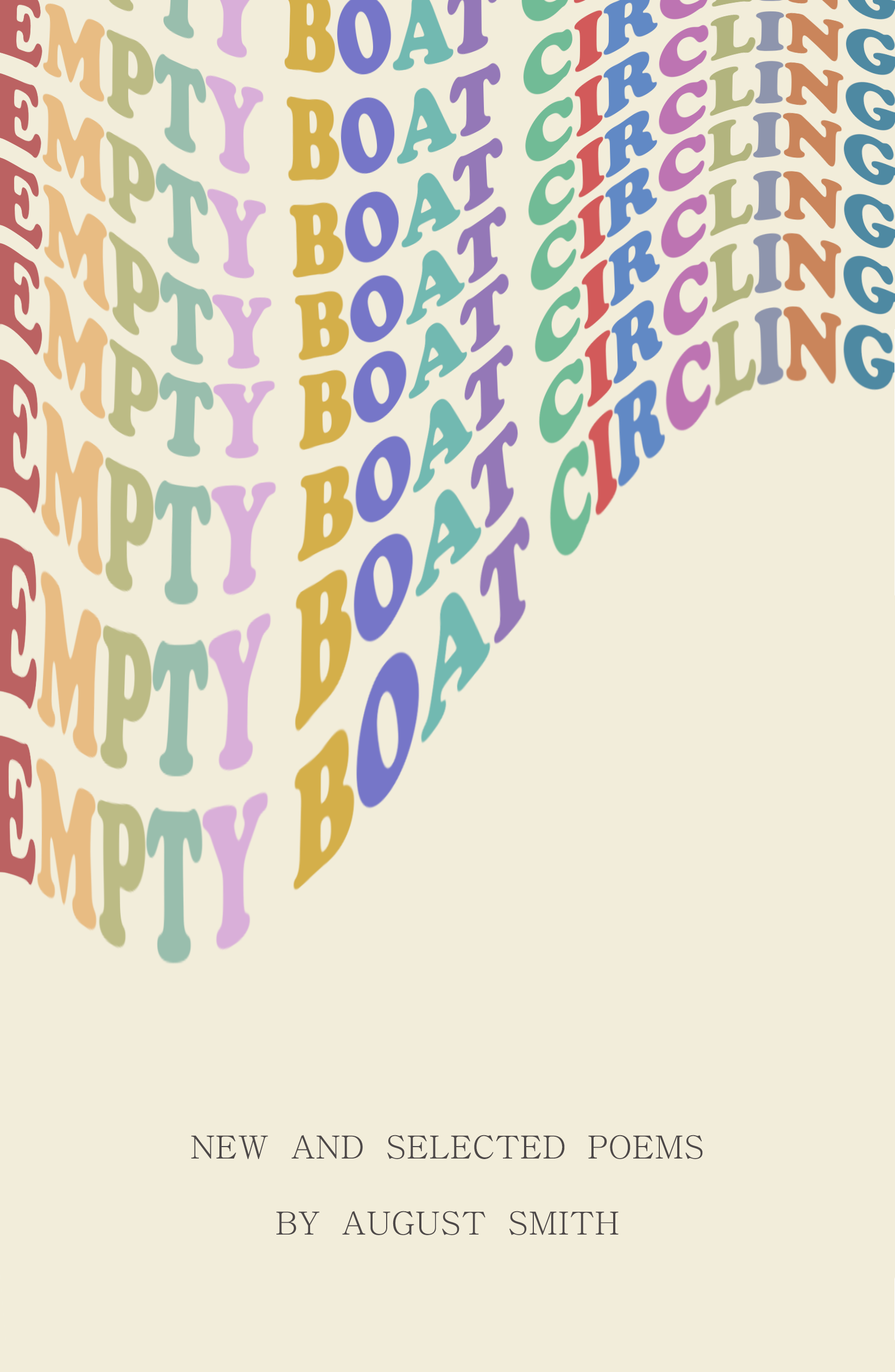
My, ah-hem, most recent chapbook (2018! I need to do another) and the one I’m most proud of, Empty Boat Circling was a gooey hodge-podge of briny brain ooze. Most importantly for us, the book’s videogame-related bits were more refined than ever before.
"Wormhole Script"
This poem, which my little brother used to open his album, is about simulation theory. The sort-of thesis: who is the simulation programmer? How does he make these endlessly complex choices for his simulation? And what’s his fuckin’ damage?
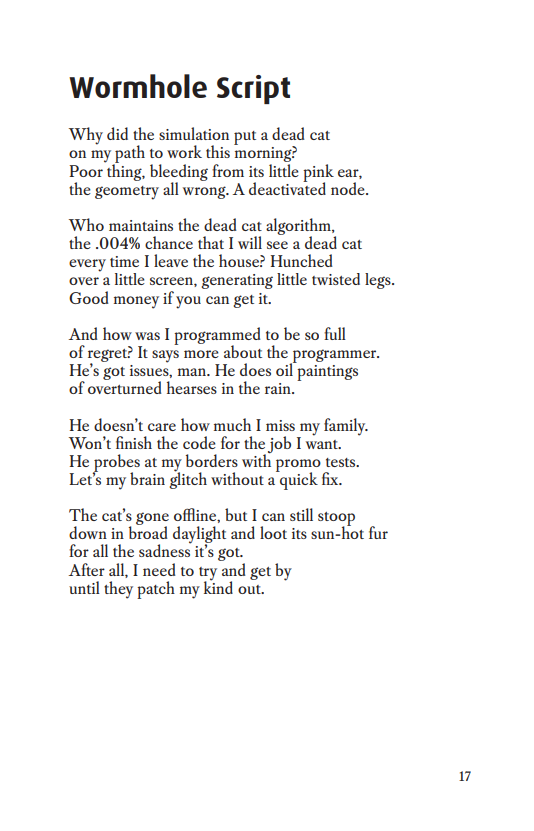
“Sonnet for a Winner is You”
This poem used snippets of poorly translated Japanese games as a way to say something about translation and by proxy, language. Like many poems, this one developed from internet surfing and research; I found (and no longer have) an archive of early game translations, and as I sifted through it, I tried to find rhymes. The sonnet form provided some rhythmic scaffolding for the lines, and I built the poem around that.
At the time I was reading Boss FIght Books’ Bible Adventures by Gabe Durham and was struck by early stories of game development, long before games had Hollywood budgets. That’s where the first few lines draw from.
I hope people don’t read this poem as making fun of “bad English” and poor translations. I suppose that’s where the sonnet form is handy. Sonnets have a built-in twist mechanic, the volta, which is the stanza-break point where the argument shifts. It allows you to start someplace shaky and then flip to someplace interesting. Here, the volta is saying, “Wait, I actually think these mistranslations are beautiful, more beautiful than any ‘accurate’ translation might be. I’d rather be the messiah than a savior. It’s a cooler word.”
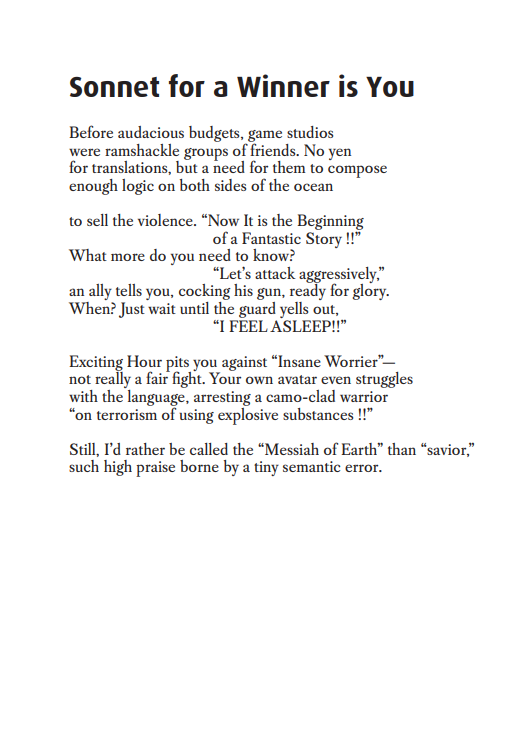
This poem was originally published by an online lit journal called Reality Beach. Now if you go to the url this is what you see:

This is, of course, an improvement over my poem.
Octopus excerpt
An excerpt from a longer project that never materialized. The idea was to write a piece of playful videogame criticism/analysis/speculation that didn’t require familiarity with any particular title. I was frustrated with essays that asked me to know 15 different games from 5 different console eras.
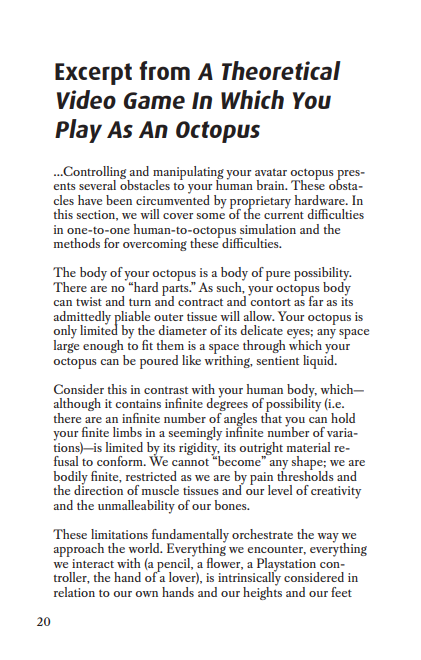

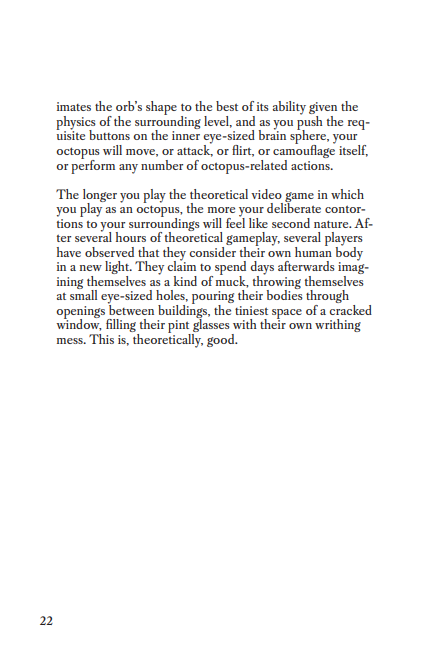
"GoldenEye Poem"
This poem is about GoldenEye 64. A fun way to write a poem is to pick a subject and try to reference it from as many angles as you can, with as many types of sentences as you can, while staying focused on some driving abstract poetic intent. But mostly I was just tickled by the quote that opens this poem. It’s a good image, James Bond walking up to Russians in hospital beds, hand outstretched. Nintendo is always naively searching for that sweet spot between the violence that the videogame market demands and the wholesomeness that is the company’s calling card.
By appending “poem” to the title of this one (a kind of non-title) and not capitalizing any lines, I tried to give it a spontaneous, one-off quality, like it’s just a few quick lines jotted down based off something I read somewhere. Maneuvers like that keep the stakes low, and that in turn can allow the poem to do sassier unexpected things.
I’m proud of the line “basically my head is a cube.”

“Quick Shimmer”
This poem is me trying to write like Wallace Stevens (“nothing that is not there and the nothing that is”) if he had played Sonic Adventure. Rotating gems and coins and arrows and such. This poem is mostly about how focusing on language and cognition too much can kind of break your perception of reality or the “simulation.” And how even if one could break out of this reality, you’re still in another reality. You can’t escape consciousness. Well, I guess you can but we won’t talk about that.

Randoms
My first chapbook has a videogame reference in it: Counter Strike 1.6. I was drawing on things/images from my childhood/teenage years for those poems, and it felt like a cozy, nostalgic reference with just enough specificity to be evocative and funny. I believe the 1.6 refers to the version number of the game’s first non-mod release, a distinguishing reference for the in-crowd.
Poem Simulator
My first game project was a game in which you make poems. I guess I got sick of writing poems about games and now I want to make games about poems. You can play it here!
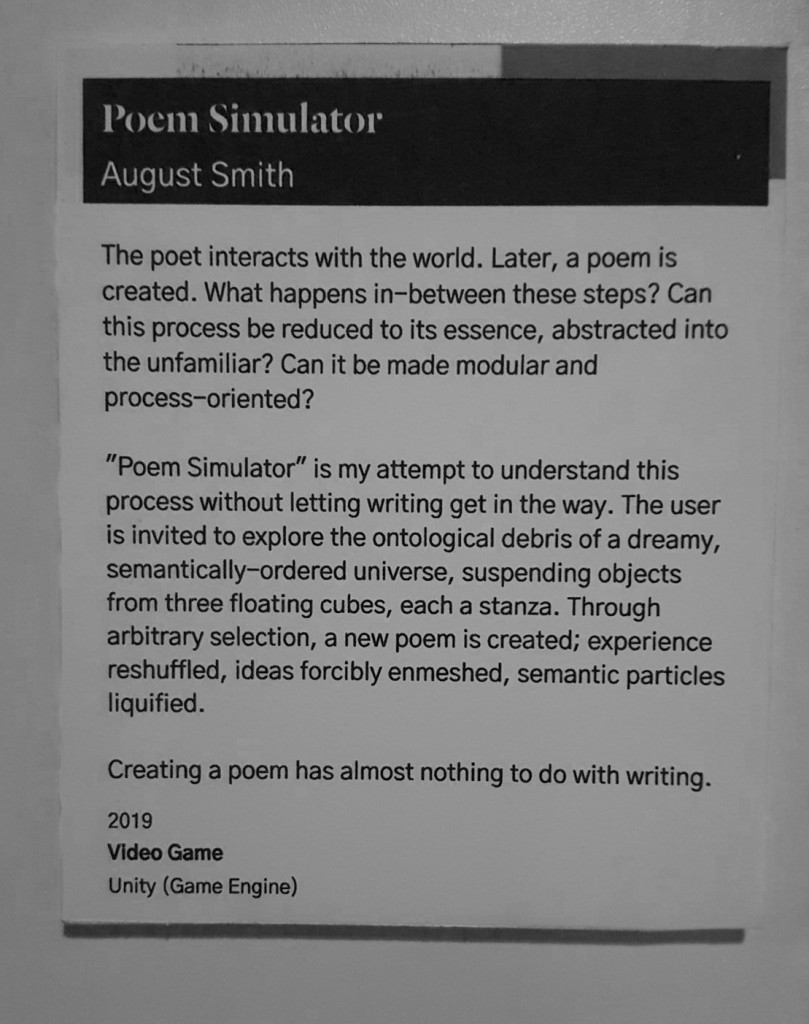
“Skeletons”
I don’t think this is a very good poem anymore (my other poem in the issue is better…) but it still merits mention. This poem fails for me because it’s too scructurally simple and too blunt in its morbidity. There’s an interesting idea buried deep in it—the way death is aestheticized and cartoonified in children’s media—but the use of anaphora and the lines about being in cemeteries make it all feel clumsy. I’d want a future version to be more blended and melodic, and less heavy-handed.
Typewritten poem for Frankie
Typewriting poems is a fun thing to do because it teaches you to commit to a line. You write yourself into a corner and have to find your way out. I typewrote this poem for my older brother and at the time he said it was his favorite thing I’ve written. It’s about multiplayer shooters, and the irony of violent gaming.
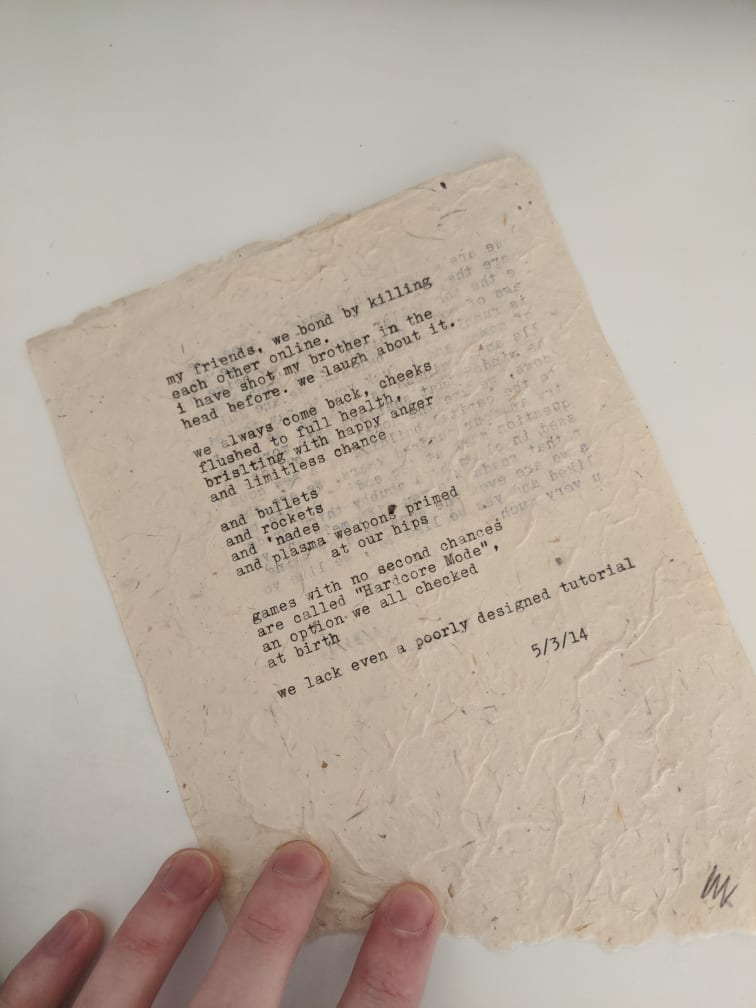
I was picturing Team Fortress 2.
1/27 ADDENDUM: "Ecco"
I forgot one! For the sake of completionism, I'll add it here. This poem about Ecco the Dolphin is from my second chapbook, 2013's I'm Having a Blast, a little stapled-together chap that I printed in my university's computer lab. This poem is still cool to me: chaotic, emphatic, twisty. I emjoy it as a deluge of ideas that seem to be desparately gesturing to some crisis of nostalgia and its constant return. I wish I had read Mark Fisher when I was writing this. The line about watching "a rose rhythmically burn to / a bass heavy slow jam until game over" is one I still stand by, though I would *not* break the line on "to" if I had written it now. That's the amateur's hand revealing itself right there.
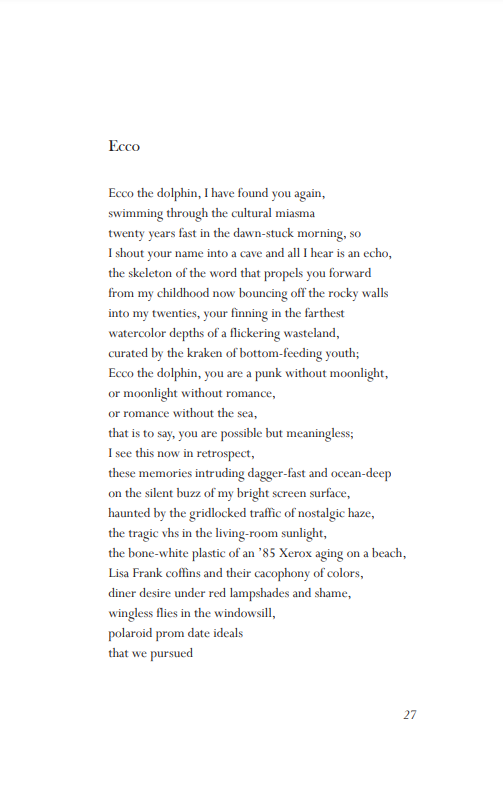
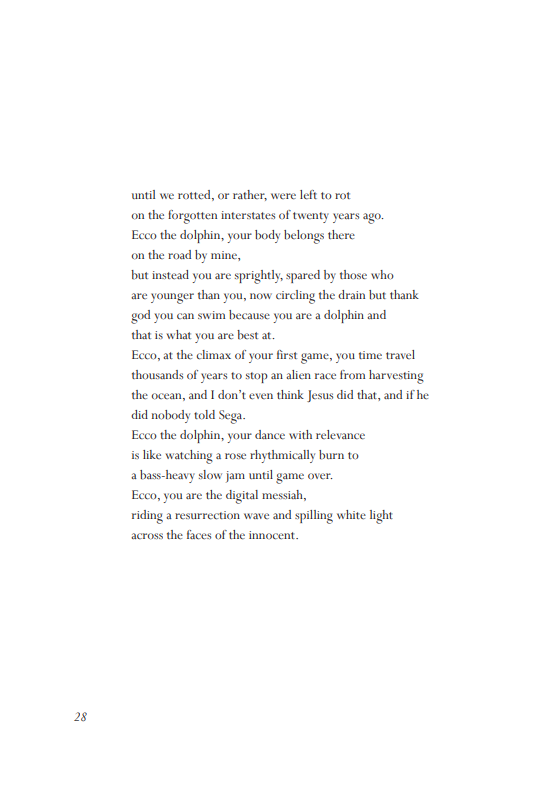
1/29 ADDENDUM: "Night of Bush Capturing"
I forgot another one. A MAJOR oversight. This one is based off real events and has a documentary quality to it. Trying to squeeze clear information like this into neat and interesting lines takes a lot of editing. There's a little trick I like in this poem. The first four stanzas are repeated, slightly altered, later in the poem, literalizing the idea of the "re-skin" that the poem is talking about. In the first few stanzas, you're "playing"/reading the original game, and later in the poem, you're playing/reading the re-skin. The language is nearly the same but with nouns swapped out, much like a simple videogame re-skin, which takes a gamme and swaps out some random visual elememnts. But the latter-stanza re-skin isn't lineated the same way as the stanzas at the beginning of the poem, revealing its own artiface and by proxy, the artiface of the original. Which ties into the theme of civilian's perceptions of war. Pretty neat huh. This one was published by Cartridge Lit.
